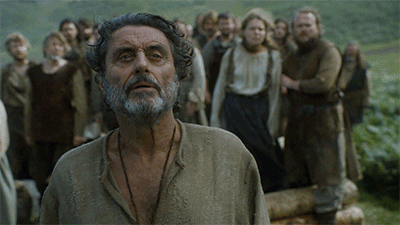George R.R. Martin has many deficiencies as a writer—like, you know, not finishing his goddamn books on time—but he has his moments, particularly when he sticks to his core themes. A few Game of Thrones episodes ago, the show articulated one of those themes nicely, when Ian McShane’s Septon Ray told the Hound, “Violence is a disease. You don’t cure a disease by spreading it to other people.”
But the show actually subverts Martin’s famous “Broken Man” speech (delivered in the book by the inspiration for Ray, Septon Meribald). The gist is that war destroys everyone it touches. But in the show, the Hound responds, “You don’t cure it by dying, either.” As Sean T. Collins argued in Vulture, that fundamentally changed the speech, replacing a call for compassion with a call for righteous vengeance. And in the next episode of the show, the Hound goes on an Archer-esque rampage, murdering the innocent and guilty alike with equal fervor.
Last night’s episode suffered from a similar moral calculus. First, Daenerys annihilates the Masters by realizing that power and intimidation are all it takes to defeat an enemy. The Battle of the Bastards was even less complex: The Good Starks were pitted against Evil Ramsay, a character so simplistically drawn he makes Lord Voldemort seem like he contains multitudes. There was no question that you were rooting for Ramsay to die, which is why his death was deemed “satisfying” in so many corners of the internet. His death was symbolically resonant–eaten by the dogs he had starved and mistreated—but still empty.
As Game of Thrones rushes to the finish line, it’s muddling Martin’s most important and lasting theme. Martin knows that violence only begets more violence, but in Game of Thrones, the only way to stop unspeakable violence is even more unspeakable violence.
